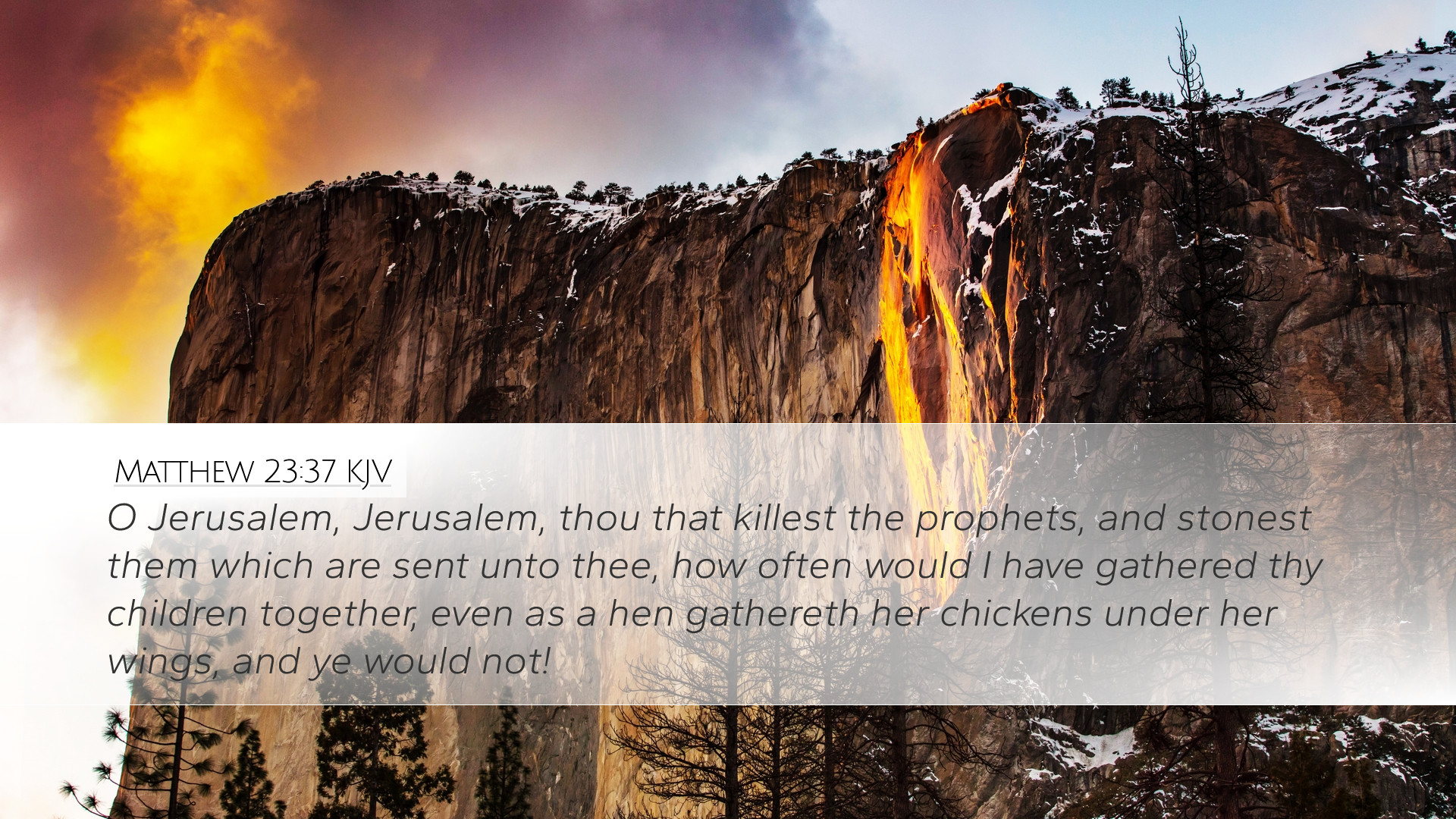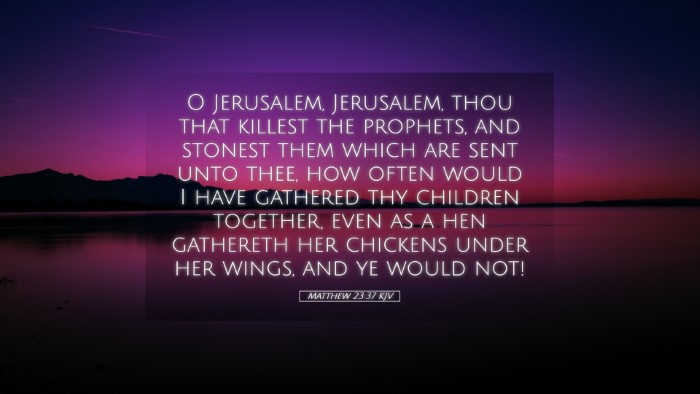Commentary on Matthew 23:37
Bible Verse: "O Jerusalem, Jerusalem, thou that killest the prophets, and stonest them which are sent unto thee, how often would I have gathered thy children together, even as a hen gathereth her chickens under her wings, and ye would not!"
Introduction
This poignant verse captures the lament of Jesus over Jerusalem, reflecting His deep sorrow for the city that had repeatedly rejected the prophets sent by God. It illustrates the tension between God's desire for redemption and humanity's resistance to His overtures of grace. Public domain commentaries provide rich insights into the theological and historical implications of this powerful statement.
Theological Significance
Jesus’ lamentation serves as a microcosm of God’s relationship with Israel and humanity. Matthew Henry notes that the repeated address to Jerusalem emphasizes the city’s significance and its tragic history of disobedience. The use of the name "Jerusalem" speaks to the heart of the Jewish religious life, representing not only a geographical location but also the spiritual center of their identity.
Divine Longing and Human Rejection
Albert Barnes reflects on the emotional intensity of Christ's words. The metaphor of a hen gathering her chicks under her wings aptly illustrates the nurturing nature of God’s desire to protect and nurture His people. This imagery portrays a God who is not distant but intimately involved and caring. Yet the counterpart to this longing is the stark reality of rejection: "and ye would not!" This statement encapsulates the human tendency to resist divine grace.
Historical Context
Understanding the historical backdrop enhances our grasp of this passage. Adam Clarke notes that Jerusalem had a long history of rejecting prophetic voices. From the days of the prophets like Isaiah and Jeremiah to John the Baptist, Jesus' predecessors faced hostility and persecution. This rejection culminated in the ultimate crucifixion of Christ, highlighting the tragic irony that the very Son of God was unrecognized by His own people.
Literary Analysis
The structure of this verse showcases the rhetorical urgency of Jesus' plea. The repetition of "Jerusalem" not only emphasizes the gravity of His message but also evokes a sense of mourning. Each component of the verse is laden with meaning:
- Addressing Jerusalem: Indicates the city’s prominent role in salvation history.
- Killing the prophets: Reflects a pattern of violence against God’s messengers.
- Gathering under wings: Signifies God’s desire for safety, shelter, and nurturing care.
- "Ye would not": Highlights human agency in rejecting divine overtures.
Contemporary Application
For pastors and theologians today, Matthew 23:37 serves as a compelling reminder of God’s relentless love and the humane choice that each individual faces regarding acceptance or rejection of divine grace. It calls for reflection on how modern 'Jerusalems' might still resist prophetic voices today, whether through complacency, skepticism, or outright rejection of the Gospel.
Pastoral Implications
This verse is highly relevant for pastoral ministry. It encourages leaders to embody the nurturing aspect of Christ, being willing to gather those who are lost, hurting, and in need of spiritual protection. It also warns against complacency within the church, as communities must not fall into the same patterns of rejection that characterized ancient Israel.
Scholarly Reflection
For scholars, this passage invites a comprehensive study of its implications within the broader narrative of Matthew. It connects with themes of repentance, the kingdom of God, and the importance of recognizing God’s messengers. Moreover, it poses questions regarding the role of prophecy and the responsibility of believers in recognizing and responding to God’s call.
Conclusion
Matthew 23:37 encapsulates a pivotal moment of divine lament over Jerusalem, rich with theological depth and practical application. It invites every reader to reflect on their response to God’s nurturing call and serves as a challenge to engage actively in God’s mission, heedless of the risks of rejection. Through the insights of Matthew Henry, Albert Barnes, and Adam Clarke, we are reminded that the heart of God yearns for His people, employing profound metaphors and historical reflection to convey His passionate desire for reconciliation.


